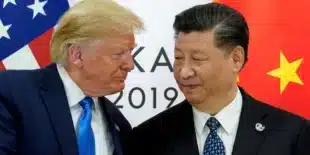Former President Donald Trump has indicated plans to reveal his choice for the next Federal Reserve chair well in advance of the end of Jerome Powell’s term, which does not expire until May 2026. This early announcement would break with longstanding norms and could mark the first time in the Federal Reserve’s 111-year history that a successor is named so far ahead of schedule.
The potential move has sparked unease among economists, former Fed officials, and market analysts, many of whom believe it would complicate monetary policy messaging and risk undermining the institution’s credibility. Concerns center on the implications of creating a so-called “shadow” Fed chair — an unofficial figurehead who could act as a parallel voice on U.S. interest rate policy without holding formal authority.
Market Disruption and Policy Confusion
Trump, who has frequently criticized Powell and the Federal Reserve for not cutting interest rates more aggressively, has pushed to exert greater influence over the central bank. Sources indicate that frustration over monetary policy decisions is driving his urgency to install a successor. The idea of announcing a chair months or even a year before the actual transition has raised alarms in financial and academic circles.
Alan Blinder, a former vice chair of the Fed, warned that placing a second influential figure into the monetary policy spotlight would risk confusing markets. Investors may be forced to interpret competing signals, particularly if the new nominee’s views diverge from current Fed leadership. Blinder cautioned that the resulting uncertainty could destabilize markets at a time when clear communication is essential.
Financial policy strategist Greg Valliere echoed these concerns in a note to clients, arguing that the presence of two perceived leaders could provoke volatility, especially if Trump’s chosen candidate is seen as aligned with his political agenda rather than economic fundamentals.
Some experts also fear that announcing a successor prematurely could politicize the Fed, compromising its historic independence. Kathryn Judge, a law professor at Columbia University who studies central banking, noted that the degree of allegiance expected by Trump could further complicate the situation. Without precedent for such an arrangement, the consequences are difficult to predict.
Dollar Reaction and Market Behavior
Markets responded to early reports of the possible nomination. Following an article from The Wall Street Journal suggesting that Trump could make his choice public by the summer, the U.S. dollar dipped slightly, indicating investor unease. The U.S. dollar index, which gauges the greenback against a basket of major currencies, fell 0.3% and reached its lowest level since early 2022.
Equities, however, appeared largely unaffected by the prospect. U.S. stock indices posted gains on the same day, moving closer to record levels. Analysts attributed this muted response to investor confidence that Powell’s leadership and the Fed’s current trajectory would remain intact in the short term.
Still, economists warn of longer-term ramifications. Joe Brusuelas, chief economist at RSM, warned that any perception of instability at the central bank could contribute to currency weakness and trigger higher borrowing costs — the very outcomes Trump is aiming to avoid.
Historical Context and Political Dynamics
Historically, sitting presidents have waited until close to the end of a Fed chair’s term to name a successor. Powell, appointed by Trump in 2018 and reappointed by President Joe Biden in 2022, has continued to lead the central bank through one of the most volatile inflationary periods in recent history.
The Trump administration’s current approach represents a significant break from established norms. It reflects a broader effort to reshape key economic institutions and reassert political influence over the Fed’s leadership, particularly with Republican majorities in both houses of Congress until 2026.
Several candidates are reportedly under consideration for the post. These include Scott Bessent, a former hedge fund executive who now serves as Treasury secretary under Trump’s re-election campaign platform; Kevin Warsh, a former Fed governor; and Christopher Waller, a current member of the Fed’s Board of Governors. Additional names floated include Kevin Hassett, formerly director of the National Economic Council, and David Malpass, who led the World Bank under Trump.
Institutional Integrity and Future Friction
Despite speculation, current Fed officials say that the naming of a successor will have no influence on ongoing policy decisions. Austan Goolsbee, president of the Federal Reserve Bank of Chicago, told media that the move would not impact the deliberations of the Federal Open Market Committee (FOMC), the central bank’s main policymaking body.
An anonymous former member of the FOMC reinforced that sentiment, noting that Powell and his colleagues would remain focused on their mandate. This official added that any nominee agreeing to an early announcement risks being viewed as beholden to political interests, which could diminish their credibility with financial markets and corporate leaders.
Even once nominated and confirmed, the new Fed chair will still face institutional checks. All monetary decisions are subject to committee votes, meaning the chair cannot unilaterally impose their will. A dissenting majority could dilute their influence if the individual is seen as overly partisan or misaligned with broader consensus.
Blinder added that early public commentary from a prospective chair could alienate existing committee members and lead to internal pushback. Such a rift within the FOMC would be rare but could introduce further instability at a time when continuity is considered critical for managing inflation and guiding economic expectations.
Prospects and Political Calculations
Trump’s intentions appear to stem from a desire to realign U.S. monetary policy with his economic outlook and to pressure the Fed to cut interest rates ahead of the 2024 election. The use of social media and public statements to critique Powell has already drawn attention, and installing a sympathetic voice in advance could amplify that campaign.


